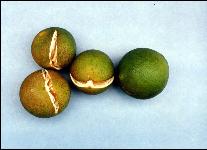Gardening Tips for Returning Part-Time Residents
by Amy L. Stripe, Master Gardener Volunteer 2008
This is a busy time for Manatee County’s Master Gardeners! Our winter residents are arriving in droves and discovering “surprises” in their gardens; happily, they are calling on us to help unravel some of the mysteries!
Landscape Challenges Galore
What to do about that lantana (Lantana camara) that was so sweet and small when you planted it in the spring and has now taken over the whole bed? And what’s that shrub? Surely not the little basil (Ocimum basilicum) plant? Why is the fruit on the orange tree splitting? There’s a huge patch of dead turf in the St. Augustinegrass (Stenotaphrum secundatum) – what’s going on? That coconut palm (Cocos nucifera) seemed okay after last winter’s bit of cold weather; why has the canopy collapsed? How come these snapdragons (Antirrhinum majus) are dead? The leaves of the new gardenia (Gardenia jasminoides) you planted have turned yellow. Why? (For some possible answers to these questions, see below.)
You get the picture. But being absent doesn’t have to make you a “victim” of random acts of Florida gardening challenges!
Know your zone!
Knowing the cold hardiness zone of your Florida home is key. Manatee County encompasses zones 9a, 9b, and 10 (zones go from lower – lower average temperatures – to higher – higher average temperatures. Ensuring your plants are cold hardy for your zone will help prevent or resolve the coconut palm problem and the snapdragon problem.
Plant (your zone’s) perennials: If you want the color you have when you leave the state to be there when you return, plant perennials that will behave accordingly. Our hot, wet summer is lethal to many traditional northern perennials.
Reduce turfgrass
Replace water-greedy turf with slow-growing groundcover. Turfgrass has its place in your landscape, but the desire for a lush, expansive green lawn may be difficult if you are away during the summer. That’s peak season for chinch bugs and many fungal diseases. And it’ll drive up your water bill in the dry months. In any case, keep in touch with your yard service to ensure a proper maintenance schedule is followed.
Mulch!
Before leaving for the summer, apply a heavy (3 to 5 inch) layer of mulch to your beds. This will keep down weeds, help retain moisture in the dry months leading up to rainy season, and keep mulch intact during heavy rains.
Don’t forget cultural practices
Before departure and upon arrival, test the irrigation system, fertilize if appropriate (in compliance with Manatee County fertilizer ordinance), and prune as needed. Early spring and late fall are great times to do all three.
Good practices: Before you leave for the summer, clean and lubricate your yard tools. Seal all chemicals tightly, including granular or powdered products, to ward off moisture or leakage. Take a neighbor who is a year-round resident out to dinner and ask them to keep an eye on your landscape.
Right Plant, Right Place
Get your soil’s pH tested so you know if it’s acidic, neutral or alkaline, and plant accordingly. Be aware of the movement of sun and shade in your landscape throughout the year. A plant tolerant of winter sun may wither in summer’s blaze. Or a shade-loving plant you thought was safe from the sun in its location is actually exposed part of the year.
Choose slow growers: If you are doing your own yard maintenance and / or don’t have a yard service looking after your property while you are away, pick plants that are compact and slow growing. You probably don’t want to face a jungle upon your return, no matter how much you love the “tropical “ look.
Possible answers
Lantana camara is an aggressive Category I invasive. Remove and replace with slower growing ground cover, or a sterile L. camara cultivar such as ‘Bloomoify Red’ or ‘Bloomify Pink.’ Basil thrives in Florida summer heat and rain. Prune back. Orange tree: Erratic irrigation / rainfall will cause fruit to split. Make sure your irrigation system has a rain gauge to shut off water in the event of rainfall. St. Augustinegrass: Check your sprinkler system for broken or malfunctioning heads. Coconut palm: Coconuts are tropical palms, better suited to zones 10 and 11. Very cold – especially freezing – temperatures may result in a fungal infection in its growing point, causing eventual collapse of the canopy. Remove and replace with a palm suitable to your zone. Snapdragons: Perennials elsewhere, they will not survive our hot, wet summer. Gardenia: This is probably an iron deficiency, due to lack of fertilization and / or soil that is too alkaline.
Visit https://edis.ifas.ufl.edu/ep450 for the Central Florida gardening calendar.
 0
0



